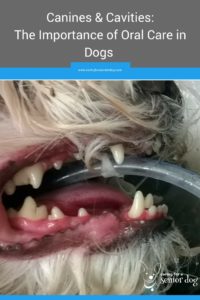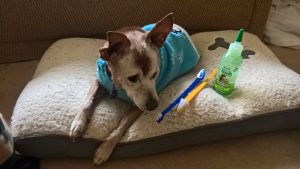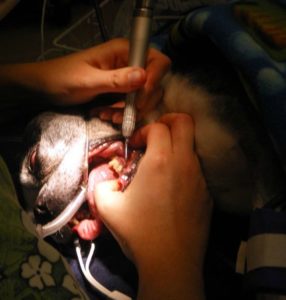It’s unfortunate dog dental care, and specifically senior dog dental care is not taken as seriously as it should be.
You want me to what? Brush my dog’s teeth? Like with a toothbrush and toothpaste? Ridiculous! Admit it, you’ve had the same reaction haven’t you!! Don’t worry you’re not alone, but hopefully by the time you reach the end of this post you’ll realise how important it really is.
In actual fact it could save your dog’s life!
While it’s not uncommon to see dental disease in young dogs, serious problems often present themselves when a dog is older. The main reason being lack of proper oral hygiene over the years finally catching up with them. The  very good news is it’s never too late to start caring for your dog’s teeth, and right now is the best time to start.
very good news is it’s never too late to start caring for your dog’s teeth, and right now is the best time to start.
Oral hygiene in dogs – why is it so important?
Serious organ damage (heart, kidney, liver) can occur when infection enters the bloodstream, which can significantly shorten your dog’s life. Let’s not forget the discomfort dental problems cause. Think about how painful a toothache or infection is to you!
Signs that may indicate dental problems
- Bad breath – contrary to popular belief, bad breath is not a given
- Pawing at his mouth
- Doesn’t let you near his mouth
- Lethargic – can be caused by bacteria in the body
- Lost interest in eating
- Seems to swallow without chewing
- Favours one side when eating
- Less interested in playing
- Isn’t chewing his favourite toys
- Drooling
Is my dog in pain?
It depends on the state of your dog’s mouth. It’s possible your dog’s oral hygiene is better than you think, and all that’s needed is regular brushing. However if that’s not the case than yes, your dog could be in a significant amount of pain, which is why regular dental checks are so important.
We can reach for pain relief, they can’t!! Dogs rely on us to keep them pain free, and because they are so good at hiding it, it’s extremely important for us to be vigilant in their care.
If I see any of these signs, what should I do?
The first thing you must do is schedule a visit to your vet to determine the current state of your dog’s teeth and mouth. Only then can a plan be mapped out, and a course of action started. Request the earliest appointment your vet has available. Your dog is obviously experiencing some level of discomfort, if not outright pain, so the sooner his problems are diagnosed, the quicker your dog will be feeling better.
What can I expect to happen during the appointment?
Your vet will have as good a look at your dog’s mouth as possible. Many dogs make that very difficult (like mine for example!!), so vets sometimes are only allowed a quick glimpse. Depending on the state of his teeth, that glimpse might be sufficient for a starting point.
Antibiotics may be prescribed to tackle the immediate infection, and eliminate the associated pain.
It’s very likely (I say this solely based on experience) surgery will be required. No one likes to hear that word (risks, expense), but you pretty much don’t have a choice.
Of course given the fact your dog is a senior, there is always a concern putting them under anaesthesia.
I had the same concerns a few years ago when Red needed dental surgery. First of all, I have complete trust in my vet, so I knew if something went wrong, it would not be because he panicked, or didn’t know what he was doing. She was given as light an anaesthetic as possible, something they would give newborns. Other then having a bad first night while the anaesthetic wore off which is to be expected, she was fine.
Your vet won’t be able to tell you exactly what work will need to be done, until he’s had a chance to properly examine your dog’s mouth when he’s sedated. Barring any problems, he’ll be home with you the same day.
Ask about pain medication, or what to expect that first night.
What measures can I take to avoid a repeat of this?
I can’t guarantee your dog won’t require veterinary intervention again, but I can make recommendations that will reduce the chances.
Regular brushing
Use doggie toothpaste and toothbrush. Ideally you’d like to give his teeth a quick brush daily, but if it’s not happening, do your best. Long handled dog toothbrushes come in a couple of different sizes, or try a rubber one  that fits over your finger. A gauze pad wrapped around your finger can be effective as well. Dental sprays and powders are also available if it’s impossible to brush your dog’s teeth.
that fits over your finger. A gauze pad wrapped around your finger can be effective as well. Dental sprays and powders are also available if it’s impossible to brush your dog’s teeth.
Dog dental chews
Dental chews can help remove plaque and stimulate the gums, and if your dog doesn’t allow you near his mouth, this will at least do some good. When choosing, look at the ingredient list and find ones with ingredients you can identify. If your dog has diet restrictions, check the ingredients with your vet first.
As always, when giving your dog bones or chews, never leave him unattended, small pieces are a choking hazard.
Chew toys for dogs
Chew toys, textured chew bones, rubber bones and rope toys are a few examples of toys to help keep on top of your dog’s oral hygiene.
Water additive
Look at it like mouthwash for dogs, it’s added to the water and, apparently, has been clinically proven to reduce plaque. Relying on this method alone will not be effective, but if you want to add it to your overall plan…
It may alter the taste of the drinking water, so if your dog isn’t liking the taste, you may want to try another flavour or brand.
Raw food diet
Gnawing on raw meat acts as a teeth cleaner, a natural toothbrush, and chewing on raw bones can help remove tartar. From what I understand, there seems to be a lower incidence of dental disease in animals on a raw food diet, although it can still happen.
A word of caution – don’t just go out and buy raw meat or raw bones for your dog. You must consult a holistic vet first (or your regular vet if they’re familiar with raw food diets) to determine if it’s right for your dog.
Regular dental checks
Senior health checks are typically carried out twice a year, so make sure a dental check is included.
Canines and cavities – conclusion
I admit brushing teeth is not something that goes down well in this household, but I like knowing there are options that help me care for my pups. What steps are you planning on taking to make senior dog dental care a part of your dog’s health and wellness plan?
I would like to invite you to join Senior Dog Care Club, a new Facebook group for senior dog parents. There you will find lots of helpful tips and advice, a place to ask questions and share experiences. I look forward to welcoming you.
If you purchase any product through a link on my website I earn a few pennies (literally!!). That money helps keep this resource going.



Vey informative article! I never realized dental care for dogs was so important. Also, it seems that raw food is better for all of us!
Hi Laura, yes dental care is extremely important in dogs. Periodontal disease can cause serious issues, including organ damage.
My nephew just switched their German Shepherd to a raw food diet. This is one reason he gave for the switch. He also said his dog has more energy on raw food and is what dogs were meant to eat.
Who knew dental hygiene in dogs is so important? It does make so much sense when you relate it to ourselves and when we get a toothache. That is such a good comparison.
Many responsible owners will benefit greatly from the measures they can take. Great list and thanks for providing it.
Peter
Hi Peter, many pet parents report remarkable changes after switching to a raw diet. For some reason, our pets’ dental health doesn’t rate too high on our concern scale. I don’t know why that is, but if they thought about why they brush their own teeth, and what happens when they let their own oral hygiene slide, it may help. Our pets are very good at hiding pain, so how upsetting is it to learn how much they may have been suffering, when it could have been so easily, well relatively easily, prevented to begin with.
Until now I never knew about teeth cleaning with a brush for dogs. I have an old King Charles spaniel and will definitely invest in a toothbrush for him now that I know how important it is. Thank you for being so informative.
Hi Charlotte, I’m so glad you were helped by this post. I think that dental care is one of the most neglected issues when it comes to our dogs and cats. Not sure why, but it is. I know brushing can be a nightmare for many pet parents (it certainly is for me) but dental products, combined with dental check ups can help prevent periodontal disease, organ damage and a host of other nasty health issues.
I have 2 canine poodles and this post was very informative for me. I will definitely keep an eye out for this! I did however see a change in their dental hygiene when we changed their diet from packaged food to home made, fresh food. I didn’t switch to raw yet, I’m not exactly sure how to approach that. Perhaps you have some insight about switching to a raw diet?
Hi, I’m so glad this post was of interest. When it comes to a raw diet, I wouldn’t just walk into a store, pick a brand and start. I know there are so many proponents of this diet, and believe it’s the most natural way to eat. By the same token, there are plenty of professionals who are concerned about a raw diet satisfying all our pets’ nutritional needs, and what supplements may be needed to complement this diet. What I would do – I would do a lot of research into the types and brands available, and what is being said about the appropriateness of raw food for my dog’s health problems. I would also only make that kind of switch after consulting with my vet. If he didn’t know enough to guide me, I would find a trusted, experienced holistic vet and speak to them about it. I hope this helps!!
Hi Hindy,
Thank you for this very informative peice. I never knew that poor dental care and oral hygiene could lead to so many nasty problems with our dogs. My dog is only young but I shall be following your advice and start paying more attention to her dental care. Thank you for highlighting this problem and I am hoping this article can make more people aware of the problem.
Marc
Hi Marc, Pleasure! For some reason we care very much about our own dental health, but don’t think much about our pets’. Now is exactly when you should start. The longer our pets’ teeth are neglected, the more dangerous the situation becomes. I have a few more posts publishing in the next couple of weeks, that will talk about toothbrushes, toothpastes and dog treats. Keep a look out for them!!
Hi Hindy…….I enjoyed this article about the importance of brushing your dogs teeth. Just like our teeth, dog’s teeth are also important to brush. I knew it was a good idea to brush your dog’s teeth, but I never knew just how many causes there are for poor dental hygiene in dogs.
I look forward to reading more about raw food diets for senior dogs on your website in the future.
Hi Steph, thank you for the comment, and so glad you enjoyed the article. Not sure why, but pets’ teeth are often neglected, yet poor oral hygiene can lead to serious health issues. I have a few more posts on this topic publishing soon, and I hope they help.
HI Hindy,
I am surprised to find out that people brush their dogs teeth. But I do know that sometimes that old dog breath can be quite foul.My mom actually had an older dog that had lost a few teeth, and I am sure she didn’t understand why. mom was elderly herself, and loved that dog. She would have loved your website. I am sure people don’t know enough about their dogs dental hygiene, and it is good that you have put together this site. I am curious as to what would you feed a dog with older gums and missing teeth? Do they need a softer diet?
Chas
Hi Chas, thank you for the comment. I know many people are surprised, but just like we have to brush our teeth for good oral hygiene and overall health, why shouldn’t the same apply to our dogs and cats? You know how painful a toothache is, imagine how our pets feel when they’re suffering and we’re not doing anything to help. Even dogs with missing teeth are usually able to eat dry food, a dog with no teeth however is a different story. It’s not so much about the teeth, it’s about providing a nutritionally balanced diet tailored to your specific dog’s needs.
Thank You!
The more I read of this article, the more I realized I need to take action. My dog’s breath has been getting increasingly worse the past few weeks. I gave him a bath a few days ago and why I dried his face I noticed a little blood on the towel, but he wouldn’t let me check his mouth. I’m going to get some brushes and get him fixed up!
Hi Kody, I’m so glad you found this article. Bleeding in a dog’s mouth is not a good sign. Don’t bother with the toothbrush right now, your priority is to get your dog to the vet as soon as possible. Let me know what happens.